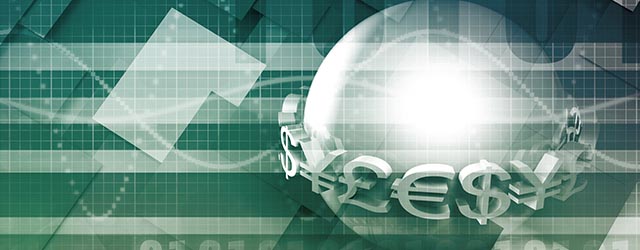Cross Rates:An unprecedented wave of cross-border mergers and acquisitions is driving demand—and rates—for foreign currencies.

Back To Supplement
When Royal Dutch Shell of the Netherlands announced plans to buy BG Group of the UK last April, creating the world’s biggest supplier of liquefied natural gas, the news drove one of the biggest moves in the British pound ever recorded in a single day. The £47 billion ($70 billion) deal, which Shell has said it expects to close in early 2016 with a combination of cash and stock, pushed the sterling up nearly 1% against the US dollar on April 8.
As M&A takes off, it’s playing a role in driving foreign exchange rates right alongside economic and monetary policy set by central banks. During the first nine months of the year, companies announced no less than $3.4 trillion worth of mergers and acquisitions around the world, according to Dealogic. By year-end 2015, Dealogic predicts that global M&A could hit $4.58 trillion, beating the $4.29 trillion full-year record set in 2007.
Corporations appear to be venturing across national borders for acquisitions more readily than ever. Cross-border M&A for the first nine months of the year was valued at $1.1 trillion, up 26% from the same period last year, according to Dealogic. And those deals accounted for 31% of global M&A.
The largest combination announced between June and September was a $40.5 billion bid by Teva Pharmaceutical Industries for Allergan Generics.
A BUYER’S MARKET
To a great extent, corporate M&A is being driven by economic and monetary policy. The timing of the surge of deals has its roots in a low-interest-rate environment that has lowered the cost of funds. Companies see smaller rivals as being for sale at a bargain price that won’t last forever. Jitters over potential rate hikes is one reason why 10 of the largest cross-border acquisitions of the year occurred between June and September.

“The flip side is that when interest rates rise, some of that appetite might be lower over time,” says Axel Merk, chief investment officer of Merk Investments, which manages mutual funds that invest directly in global currencies.
But eurozone companies are likely to remain affordably priced acquisition targets for non-European corporations for at least the next 18 months.
“While the Fed is moving in one direction and getting ready to raise interest rates and embark on a tightening cycle, the European Central Bank is going in the other direction and easing monetary policy,” says Eric Viloria, a currency strategist at Wells Fargo in New York.
The result, Viloria predicts, will be a continued slide of the euro against the US dollar. He expects the euro to weaken to 1.09 by the end of this year, and to 0.99 by year-end 2016.
Corporate bargain-hunters outside Europe would appear to agree. They acquired $300.6 billion worth of equity in European companies during the first nine months of this year, up 78% from the same period last year. US-based companies bought 44% of that equity, valued at $131.2 billion—more than they have acquired in Europe in any nine-month period over the past five years.
MANAGING VOLATILITY
As a result, M&A is generating some of the world’s largest foreign exchange transactions. The world’s largest banks—those with the largest and most user-friendly trading platforms—are benefiting.

“What’s interesting is the execution advisory related to these large M&A flows, especially in less-liquid Scandinavian currencies, where only the largest banks by market share, like Nordea, have the capability to execute large FX transactions with minimal market impact,” says Antti Ranta, head of FX at Nordea Bank in Helsinki.
A new factor came into play when Beijing devalued the renminbi in August and subsequently spent billions of dollars propping it up. Now the Chinese currency is considered just as potentially volatile as any other.
“What has changed is that you now have to worry about currency risk in China,” says Merk. “Historically, you did not have to worry about that.”
Currency volatility does not seem to have slowed down M&A in China, where Dealogic reported 2,645 deals worth $384.3 billion during the first nine months of the year. That was the second-highest volume reported for any country except the US, with 7,895 deals worth $1.7 billion.
Asia in general is having a strong M&A year. From January to September, companies based in Asia announced plans to buy $165.4 billion worth of equity outside the region. That was the highest volume ever recorded in the region for the first nine months of any year, according to Dealogic. Hong Kong’s Hutchison Whampoa, for example, plans to buy Telefónica UK for $15.5 billion. Hutchison’s 3G division has offered $11.9 billion for Italy’s Wind Telecomunicazioni.
Because corporate acquisitions are planned months if not more than a year in advance, corporate treasurers can be expected to hedge their bets deftly. Most deals are financed in both equity and cash, and the cash portion tends to be hedged. Teva, for example, has said it will pay Allergan $33.8 billion in cash, and the rest in stock.
“Some of the deals being done are very large, and it does make sense, especially if there is a cash component to it, that there will be some hedging,” says Merk.
A reason corporations hoard cash before an acquisition is to manage the risk of integrating a new revenue stream that is denominated in the currency where the acquired company is located, he says.
While the Fed is moving in one direction and getting ready to raise interest rates and embark on a tightening cycle, the European Central Bank is going in the other direction and easing monetary policy.
~ Eric Viloria, Wells Fargo
Either way, corporations that are engaged in cross-border mergers are now gravitating toward foreign exchange derivatives with greater alacrity than they have since the days before the global financial crisis of 2008 gave derivatives a bad name. “FX [foreign exchange] spot, forwards and swaps are, and are likely to remain, the most used products in the FX space,” says Ranta
To be sure, banks will ultimately hit a limit to the foreign exchange services they can sell their corporate clients. Regulators have taken a closer look at cross-border currency transactions since US and European watchdog agencies fined seven banks $10 billion for manipulating international currency markets last year. In September, Perry Stimpson, a former Citigroup currency trader, told a London court that a corporate acquisition for one of the bank’s clients led to a spot transaction that was large enough to move the exchange rate higher. He claimed that the bank earned a $35 million profit on that transaction.
Citigroup denied the handful of allegations brought by Stimpson, although it did admit to the felony charge brought by the US Justice Department of rigging the foreign currency market.



